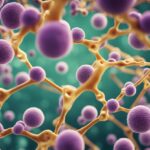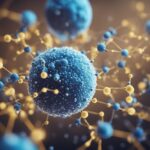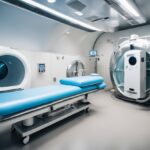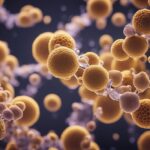Autophagy, a natural process of the body, has been gaining attention in the field of anti-aging research. The term “autophagy” comes from the Greek words “auto” meaning self and “phagy” meaning eating. It refers to the body’s ability to recycle and remove damaged or dysfunctional cellular components, such as proteins and organelles, to maintain cellular homeostasis.

Recent studies have shown that autophagy plays a crucial role in the aging process. As we age, the efficiency of autophagy declines, leading to the accumulation of damaged cellular components and the development of age-related diseases. Therefore, enhancing autophagy has become a promising strategy for anti-aging interventions.
In this article, we will explore the fundamentals of autophagy, its connection to aging, and the different molecular targets, nutritional strategies, pharmacological interventions, lifestyle and environmental factors, and emerging research and clinical trials that aim to enhance autophagy for anti-aging purposes.
Key Takeaways
- Autophagy is a natural process of the body that involves the recycling and removal of damaged cellular components.
- Autophagy plays a crucial role in the aging process, and enhancing it has become a promising strategy for anti-aging interventions.
- Different approaches, such as molecular targets, nutritional strategies, pharmacological interventions, lifestyle and environmental factors, and emerging research and clinical trials, aim to enhance autophagy for anti-aging purposes.
Fundamentals of Autophagy
Definition and Mechanisms
Autophagy is a cellular process by which cells recycle their own components. The term autophagy comes from the Greek words “auto” meaning self and “phagy” meaning eating. Autophagy is a mechanism that cells use to maintain their health and survival by removing damaged or unnecessary cellular components. Autophagy is initiated by the formation of a double-membrane vesicle called an autophagosome, which engulfs the target material and fuses with lysosomes to degrade and recycle the material.
Autophagy is regulated by a complex network of signaling pathways involving proteins such as mTOR, AMPK, and Beclin-1. mTOR is a protein kinase that inhibits autophagy, while AMPK is a protein kinase that promotes autophagy. Beclin-1 is a protein involved in the initiation of autophagy. The balance between these signaling pathways determines the level of autophagy in the cell.
Evolutionary Role in Organisms
Autophagy is a highly conserved process that is present in all eukaryotic organisms. It is thought to have evolved as a response to nutrient deprivation and other stresses that threaten cellular homeostasis. Autophagy allows cells to survive under conditions of nutrient deprivation by recycling their own components to generate energy and maintain cellular function.
Autophagy also plays a role in cellular differentiation, development, and aging. In particular, autophagy has been implicated in the aging process and in age-related diseases such as neurodegenerative disorders, cancer, and metabolic disorders. By removing damaged proteins and organelles, autophagy helps to maintain cellular homeostasis and prevent the accumulation of toxic materials that can contribute to disease.
Overall, autophagy is a fundamental cellular process that plays a critical role in maintaining cellular health and survival. Further research is needed to fully understand the mechanisms of autophagy and its role in aging and disease.
Autophagy and Aging
Autophagy, the cellular process of self-digestion, has been implicated in the aging process. As cells age, their ability to properly carry out autophagy declines, leading to the accumulation of damaged proteins and organelles. This accumulation is thought to contribute to the development of age-related diseases such as Alzheimer’s and Parkinson’s.
Theories of Autophagy-Related Longevity
Several theories have been proposed to explain the relationship between autophagy and longevity. One theory suggests that autophagy promotes longevity by removing damaged proteins and organelles, which can otherwise lead to cellular dysfunction and death. Another theory proposes that autophagy may enhance cellular stress resistance, allowing cells to better withstand the aging process.
Cellular Senescence and Autophagy
Cellular senescence, the irreversible cessation of cell division, is another process that has been linked to aging. Recent research has suggested that autophagy may play a role in regulating cellular senescence. Specifically, autophagy may help to clear senescent cells, which can otherwise contribute to the development of age-related diseases.
Overall, the relationship between autophagy and aging is complex and multifaceted. While autophagy has been shown to play a role in promoting longevity, its exact mechanisms and effects are still being investigated. However, the potential for autophagy to mitigate age-related diseases makes it an exciting area of research for anti-aging therapies.
Molecular Targets for Anti-Aging

mTOR Pathway
The mammalian target of rapamycin (mTOR) pathway is a key player in regulating cellular growth and metabolism. However, overactivation of the mTOR pathway has been linked to aging and age-related diseases. Autophagy, a cellular process that removes damaged organelles and proteins, is regulated by mTOR. Inhibition of mTOR has been shown to increase autophagy and extend lifespan in various organisms. Therefore, targeting the mTOR pathway is a promising strategy for anti-aging interventions.
AMPK Activation
AMP-activated protein kinase (AMPK) is a cellular energy sensor that regulates cellular metabolism. Activation of AMPK has been shown to increase autophagy and promote longevity. Studies have demonstrated that activation of AMPK can delay age-related diseases and extend lifespan in various organisms. Therefore, AMPK activation has emerged as a potential target for anti-aging interventions.
Sirtuin Regulation
Sirtuins are a family of proteins that regulate cellular metabolism and stress response. They have been implicated in aging and age-related diseases. Sirtuins regulate various cellular processes, including DNA repair, metabolism, and inflammation. Activation of sirtuins has been shown to extend lifespan and delay age-related diseases in various organisms. Therefore, targeting sirtuin regulation is a promising strategy for anti-aging interventions.
In summary, targeting molecular pathways involved in regulating cellular metabolism and stress response, such as mTOR, AMPK, and sirtuins, is a promising strategy for anti-aging interventions. Inhibition of mTOR, activation of AMPK, and regulation of sirtuins have been shown to increase autophagy and promote longevity in various organisms. Further research is needed to fully understand the mechanisms underlying these pathways and to develop safe and effective anti-aging interventions.
Nutritional Strategies

Caloric Restriction
Caloric restriction is a well-known method to promote autophagy. It involves reducing calorie intake by 20-30% without causing malnutrition. Studies have shown that caloric restriction can increase autophagy, reduce oxidative stress, and enhance lifespan. However, it is important to note that caloric restriction should be done under the supervision of a healthcare professional.
Intermittent Fasting
Intermittent fasting is another way to induce autophagy. It involves alternating between periods of fasting and eating. There are different types of intermittent fasting, such as the 16/8 method, where one fasts for 16 hours and eats within an 8-hour window. Studies have shown that intermittent fasting can increase autophagy, improve insulin sensitivity, and reduce inflammation.
Ketogenic Diet and Autophagy
The ketogenic diet is a high-fat, low-carbohydrate diet that has gained popularity in recent years. It has been shown to increase autophagy by reducing insulin and glucose levels. The diet promotes the production of ketones, which are used as an alternative fuel source for the body. This leads to a decrease in oxidative stress and inflammation, which can promote autophagy.
Overall, nutritional strategies such as caloric restriction, intermittent fasting, and the ketogenic diet can promote autophagy and potentially slow down the aging process. However, it is important to consult with a healthcare professional before making any significant dietary changes.
Pharmacological Interventions
Rapamycin and Lifespan Extension
Rapamycin is a drug that has been shown to extend the lifespan of various organisms, including mice. It works by inhibiting the mTOR pathway, which is a key regulator of cell growth and metabolism. By inhibiting mTOR, rapamycin induces autophagy, which is thought to be a major contributor to its anti-aging effects.
In addition to its effects on lifespan, rapamycin has also been shown to improve various age-related diseases, such as cancer, neurodegeneration, and cardiovascular disease. However, it should be noted that rapamycin also has some side effects, such as immunosuppression and glucose intolerance.
Metformin and Autophagy Induction
Metformin is a drug that is commonly used to treat type 2 diabetes. However, it has also been shown to induce autophagy, which is thought to contribute to its anti-aging effects. Metformin works by activating the AMPK pathway, which is a key regulator of cellular energy metabolism.
In addition to its effects on autophagy, metformin has also been shown to improve various age-related diseases, such as cancer, cardiovascular disease, and cognitive decline. However, it should be noted that metformin also has some side effects, such as gastrointestinal discomfort and lactic acidosis.
Overall, pharmacological interventions such as rapamycin and metformin show promise for anti-aging interventions. However, more research is needed to fully understand their mechanisms of action and potential side effects.
Lifestyle and Environmental Factors

Exercise and Autophagy
Regular exercise has been shown to stimulate autophagy and promote cellular health. Exercise triggers a cellular response that activates autophagy, leading to the removal of damaged organelles and proteins. This process helps to prevent the accumulation of damaged cellular components, which can contribute to aging and age-related diseases.
Studies have shown that both aerobic and resistance exercise can stimulate autophagy. Aerobic exercise, such as running or cycling, has been shown to increase autophagy in skeletal muscle, while resistance exercise, such as weightlifting, has been shown to increase autophagy in muscle cells.
Sleep and Autophagy Regulation
Sleep is essential for the regulation of autophagy. During sleep, the body undergoes a process of cellular repair and regeneration, which is facilitated by autophagy. Lack of sleep or disrupted sleep patterns can lead to impaired autophagy and cellular dysfunction.
Research has shown that sleep deprivation can inhibit autophagy, leading to the accumulation of damaged cellular components and increased oxidative stress. In contrast, adequate sleep has been shown to promote autophagy and cellular health.
In conclusion, lifestyle and environmental factors such as exercise and sleep play a crucial role in the regulation of autophagy and cellular health. Incorporating regular exercise and maintaining healthy sleep habits can help to promote autophagy and prevent age-related diseases.
Emerging Research and Clinical Trials
Biomarkers of Autophagy
One area of research in autophagy is the identification of biomarkers that can be used to measure autophagy activity. Several potential biomarkers have been proposed, including LC3-II/LC3-I ratio, p62/SQSTM1, and beclin-1. These biomarkers have been used in preclinical studies and clinical trials to assess autophagy induction and inhibition. However, there is currently no consensus on which biomarker is the most reliable and sensitive for measuring autophagy activity in humans.
Potential Therapies in Development
There is growing interest in developing autophagy-targeted therapies for age-related diseases. Several compounds have been identified as potential autophagy inducers, including rapamycin, spermidine, and trehalose. Clinical trials are underway to evaluate the safety and efficacy of these compounds in treating age-related diseases such as Alzheimer’s disease, Parkinson’s disease, and cancer.
In addition to autophagy inducers, there are also compounds that inhibit autophagy, such as chloroquine and hydroxychloroquine. These compounds have been used in combination with chemotherapy to enhance the efficacy of cancer treatment. However, the use of autophagy inhibitors in aging-related diseases is still controversial, as autophagy is a complex process that can have both beneficial and detrimental effects depending on the context.
Overall, the emerging research and clinical trials in autophagy suggest that targeting this process may hold promise for treating age-related diseases. However, more research is needed to fully understand the role of autophagy in aging and to develop safe and effective autophagy-targeted therapies.










